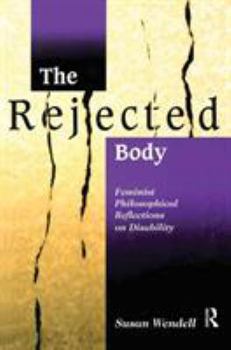The Rejected Body: Feminist Philosophical Reflections on Disability
Select Format
Select Condition 
Book Overview
The Rejected Body argues that feminist theorizing has been skewed toward non-disabled experience, and that the knowledge of people with disabilities must be integrated into feminist ethics, discussions of bodily life, and criticism of the cognitive and social authority of medicine. Among the topics it addresses are who should be identified as disabled; whether disability is biomedical, social or both; what causes disability and what could 'cure' it; and whether scientific efforts to eliminate disabling physical conditions are morally justified. Wendell provides a remarkable look at how cultural attitudes towards the body contribute to the stigma of disability and to widespread unwillingness to accept and provide for the body's inevitable weakness.
Format:Paperback
Language:English
ISBN:0415910471
ISBN13:9780415910477
Release Date:June 2006
Publisher:Routledge
Length:214 Pages
Weight:0.70 lbs.
Dimensions:0.5" x 6.0" x 9.0"
Customer Reviews
2 ratings
The personal IS political
Published by Thriftbooks.com User , 20 years ago
Susan Wendel examines how disability is inherently a sociopolitical construction. Replacing previous medical models, Wendel persuasively argues that women with disabilities are a multiply oppressed class, echoing the works of Gloria Anzaldua...etc. Because prioritizing among disability, sex and other idenities is impossible, Wendel instead advances an analysis which intergrates all components into a social justice tool. Some women with disabilities also desire to become mothers, but the state maintains (albeit in more 'covert' language than eugenics statues) restrictions against the sexuality of women with disabilities. The idea that women with disabilities are also sexual beings remains a shocking concept. For all of society's theoretical tolerance, it still panics whenever people do not have 'perfect bodies' especially because of disability. Since women still are judged by their bodies, this schema ultimately amplifies our subordination...and inadvertently provides resistance incentive.
A Thoughtful Exploration of Disability and Feminism
Published by Thriftbooks.com User , 25 years ago
Wendell's book is an important contribution to the emerging field of disability studies because it includes women's perspectives on disability. This may not seem to be a significant contribution, but it should be understood that since disability has largely been constructed within a medical framework, the experiences of women with disabilities have been ignored, discounted, and obliterated. What's even better is that Wendell teaches us how to think about disability and feminism without having the bends over postmodernism or the French feminists.In other words, the book is readable. I highly recommend it.





